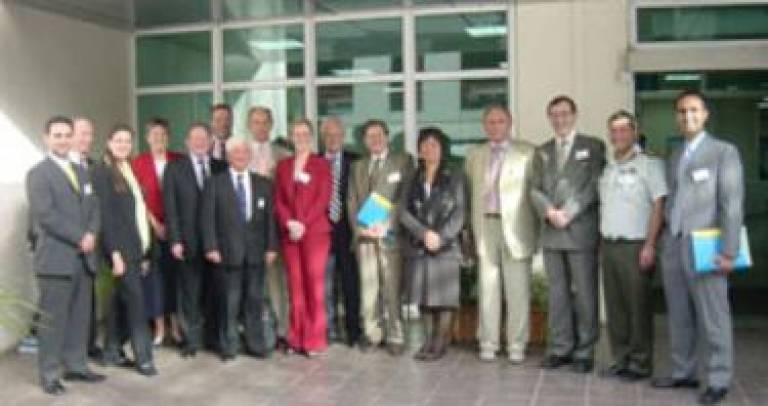Iraqi medical training
7 July 2004
Representatives from UCL's Eastman Dental Institute are helping to modernise the provision of health services by retraining Iraqi medical staff.

Eastman delegates collaborated in a seminar to update Iraqi doctors and senior nurses on advances in the management of head and neck cancer. The seminar was held at the King Hussein Cancer Center in Amman, Jordan.
In the immediate post Iraq war period, consultation with British experts working in Iraq to rebuild medical services revealed that over the previous decade, clinical, surgical and nursing staff had effectively been cut off from the rest of the world in their work. This had resulted in a lack of information about advances in medical and surgical services, especially in the management of the cancer patient. The seminar programme aimed to redress the situation by delivering the latest research findings and modern treatment protocols for the management of head and neck cancer patients.
The Eastman's Dr Mohamed El-Maaytah and Professor Crispian Scully CBE along with Eastman Honorary Senior Research Fellow Mr Brian Conroy MBE and Miss Joan Grieve of the National Hospital for Neurology and Neurosurgery, worked with eleven other eminent surgeons and medical oncologists based at centres across the UK to present a three-day lecture programme.
The seminar was attended by 32 Iraqi surgeons, radiotherapists and senior nurses. 10 Palestinian doctors and 170 Jordanian medical, dental and nursing staff also participated. The seminar was held under the patronage of Her Majesty Queen Noor. The King Hussein Foundation played a major role in planning the event and liaising between the British teaching faculty and the Jordanian professionals.
Chief organiser of the event was Mr Conroy, who is Honorary Secretary of the Norman Rowe Educational Trust, a foundation committed to providing humanitarian aid to those in need, especially in the medical, dental and educational fields. The Trust was established in memory of Eastman consultant maxillofacial surgeon Mr Norman Lester Rowe, a much admired and respected surgeon and teacher and one of the foremost British medical and dental ambassadors of his day.
In his capacity at the Trust, Mr Conroy became involved in recruiting the 14 members of the teaching faculty and overcoming the many logistical problems of arranging the educational programme in Jordan. Two Jordanian graduates from the Eastman, Dr Zaid Baqain and Dr Mohamed El-Maaytah, played a vital role in helping to organise the teaching programme, both in the early planning stages and during the actual seminar. British Council directors in Iraq and Jordan were instrumental in locating the Iraqi doctors and nurses, arranging their transportation from all parts of Iraq and funding their travel and accommodation. Six professional foundations and nine commercial organisations in the UK funded the 14 travel fellowships for the teaching faculty and 10 travel grants for other delegates not resident in Jordan.
With patchy telephone services and minimal access to email facilities in Iraq, identifying and recruiting Iraqi delegates to maintain a balance of clinical specialties and geographical areas within Iraq was a particular challenge. Mr Conroy explained that he had been moved by the dedication of the clinicians and nurses who were finally selected. He said: "The delegates had to travel through very difficult terrain and under dangerous conditions in order to attend the seminar. Three delegates from Basra in the south of Iraq had unfortunately to turn back when they came under attack. On the first day of the course, many of the Iraqi delegates showed signs of tiredness and were somewhat subdued, no doubt reflecting their difficulties in reaching Jordan. At the completion of the seminar, the delegates expressed how worthwhile the seminar had been and said that what they had learned could bring tremendous benefits to the patients they serve."
The Iraqi clinicians and nurses also showed great enthusiasm for the second phase of the project, a six-week visit to the UK that is now being planned by the Trust. It is hoped that the opportunity for Iraqi surgeons, medical oncologists and nurses to see patients undergoing treatment will help to consolidate what they learned during the seminar. Mr Conroy explained: "We plan for the Iraqi delegates to meet our maxillofacial team and spend time at the Eastman Dental Hospital, the Royal Marsden Hospital and visit other major cancer centres in and around London. The Norman Rowe Trust is currently working on the details of the visit, especially raising the necessary funding."
On behalf of the Trust, Mr Conroy thanked all those who had supported the seminar, especially the British Council, the King Hussein Foundation, the King Hussein Cancer Center, the Elsevier Medical Publishing Foundation and particularly Her Majesty Queen Noor who had facilitated the provision of the superb venue for the course, and enabled the Iraqi delegates to enter Jordan. Mr Conroy said that he hoped that the overwhelming success of the seminar and what it had achieved would encourage and stimulate other clinical groups to run similar programmes for the benefit of the Iraqi medical and nursing professionals. He said: "There is enormous potential to help to rebuild the medical and surgical infrastructure in Iraq through programmes of this kind".
Image: The organisers of the seminar in Jordan.
To find out more about the Eastman, use the link below.
Link: Eastman Dental Institute
 Close
Close

